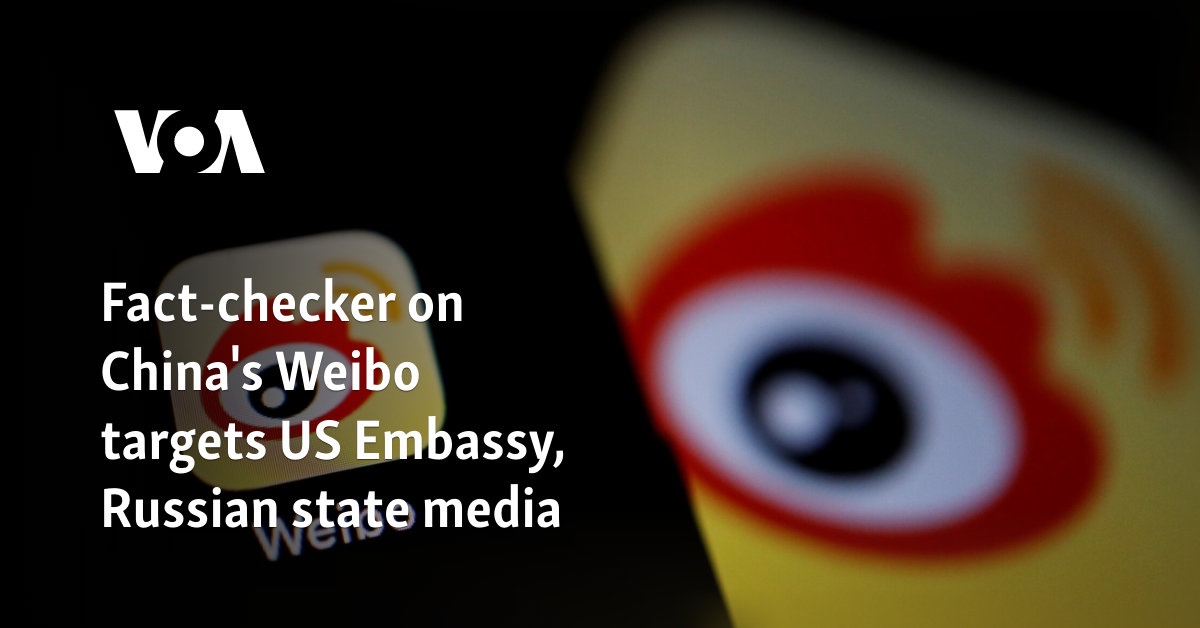


This month, when a story claiming Ukrainian President Volodymyr Zelenskyy had secretly purchased a $24 million castle from the British royal family went viral on China’s Weibo social media platform, something interesting happened.
A fake-news function on the platform debunked it as misinformation.
Since Russia launched its invasion of Ukraine in early 2022, Chinese social media platforms have been full of pro-Russia false claims and conspiracy theories, some of which the Chinese government has endorsed.
Influential Chinese nationalist bloggers, as well as Russia’s state media RT, regularly post and spread misinformation on Weibo.
Less than 20 hours after RT posted the misinformation about Zelenskyy, Weibo attached a fact-checking note to the post.
Public criticism of Russian state media is rare in China, but the fact-check function is part of Weibo’s latest effort to regulate misinformation on the site.
Weibo rolled out the feature, called Side Note, last August. Side Note allows qualified users to submit fact-checking notes on others’ posts for Weibo to review.
Over the past few months, users have added Side Note to posts from high-profile Weibo bloggers and foreign government-backed accounts, including RT and the U.S. Embassy in China.
Weibo has tried to appear neutral when deciding what kind of misinformation to fact-check, debunking false claims from both liberal and nationalist influencers.
But it has also used the feature to push Beijing’s talking points on international issues. So far, Chinese government and state media accounts have not been subject to any fact-checking.
Weibo’s version of Community Note
In July 2023, China’s internet regulator told social media companies to crack down on false information.
” ‘Personal media’ that create and publish rumors, stir up hot societal topics or matrix [linked cross-platform] publish and transmit illegal or negative information, creating a vile impact, are all to be closed, included in the platform database of blacklisted accounts, and reported to the internet information departments,” said a memo from Central Cyberspace Administration of China.
A month later, Weibo, one of China’s biggest social media apps with a focus on news and current issues, came out with the Side Note feature.
Like the Community Note function on X, Side Note lets qualified users take on the job of fact-checking, with Weibo getting the final say on approval or rejection.
Other U.S. social media firms offer similar features. Facebook and Instagram offer “community standards” and “community guidelines,” respectively, which flag posts containing disinformation.
But unlike these firms, Weibo itself decides which posts stay up.
The company says it selects qualified users from those with verified identities or high Weibo credit scores and is gradually expanding the feature to include more users.
Side Note targets US Embassy
Since January, posts by the U.S. Embassy in China have been tagged with Side Note at least three times.
A post detailing U.S. Secretary of State Antony Blinken’s expressed concerns about China’s religious freedom received two notes, one accusing Blinken of having “no regard for facts.”
A February post sanctioning 17 Chinese companies for helping Russia’s war effort in Ukraine got a note that included a Chinese Foreign Ministry spokesperson’s public remarks.
And a post last month condemning Beijing for a collision between Chinese and Philippine coast guard vessels got a Side Note message from Shen Yi, a prominent Chinese international relations professor with a strong nationalistic leaning.
In the note, Shen accused the U.S. of spreading misinformation on multiple “global social media platforms” to “smear China’s national image.”
Chinese government accounts immune
Most posts tagged with Side Note belong to influencers, including nationalist bloggers.
For example, Shu Chang, who runs the popular nationalist account Guyan Muchan, saw a Side Note added to a post last week claiming that schoolchildren in the U.S. have to learn how to use “bulletproof boards” in classrooms. The Side Note clarified that the photos were from a hurricane self-protection exercise.
In recent years, nationalist bloggers like Shu have become some of the most traffic-drawing opinion leaders on Weibo.
Eric Liu, who analyzes Chinese censorship at China Digital Times, says one shouldn’t read too much into Weibo fact-checking Shu’s post.
“A lot of her stuff isn’t state narratives. She sensationalized it herself,” Liu told VOA. “Weibo doesn’t really have to protect her. Plus, [fact-checking her posts] adds to the credibility of the Side Note feature.”
Liu, who worked as a censor for Weibo and other Chinese internet companies before moving to the U.S., pointed out that Weibo has not used Side Note to fact-check government accounts or false information from state media.
In a November post, Weibo thanked users for submitting Side Notes.
“Ever since Side Note went online, active participation from every Side Note-er has effectively lowered the negative impact of controversial content and biased information, helping all users access information that’s truer and more comprehensive,” the post said.
But Liu doesn’t think of Side Note as a feature that truly gives users the power to regulate speech on the platform, because Weibo remains the final arbitrator of what notes can be added to what posts.
“Weibo’s Side Note isn’t something that netizens can fully edit, as it’s still user-generated content,” he said. “In the end, it still needs to be reviewed by censors.”
Weibo did not respond to VOA’s request for comment.
Evie Steele contributed to this report.